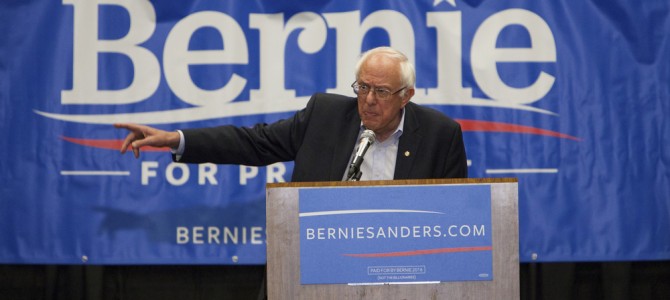
“Life is fair!” said nobody, ever. Why? Because anyone who is naïve enough to think that the world conforms to their seemingly innate sense of fairness is too young to articulate such a complex notion.
I’m sure one of your parents broke the news to you that the opposite is true, perhaps after your sister got to spend the night at a friend’s house and you had to stay home, or your brother got just a little bit bigger slice of cake than you did.
I know, the tragedy. Yet what’s truly bizarre is how many people, knowing life isn’t fair, continue to believe the almost-as-infantile idea that if we just have the right rules, and enough of them, then life can be fair. Or at least fair enough to dampen their perpetual outrage at life’s grotesque unfairness.
Clearly, presidential candidate Bernie Sanders has taken this to heart, making unfairness, particularly the economic sort, the center of his campaign. In his speech on July 18 in Phoenix, he spoke at length about the “grotesque level of income and wealth inequality” in America, asserting that the wealth of the bottom 99 percent barely outweigh the immense wealth of the top 1 percent.
His legislative remedies range from free public college to universal healthcare to a $15 minimum wage, all aiming to make American life more fair—to produce more equal socioeconomic outcomes for us all, despite where we start out in life or the choices we make.
Other, slightly more-enlightened individuals understand and accept that the universe does not, in fact, ever produce 100 percent equal outcomes for equal actions, much less equally positive outcomes for unequal actions. When you were in elementary school, for instance, and the girl across the room always got called on to answer the questions, even though you raised your hand just as often and knew all the answers, you felt that wasn’t fair.
Our Unconscious Notions of Fairness
Not everyone sees fairness exactly the same way—indeed, the nature of fairness is one of the great ideological divides across the political landscape. Yet there is a tacit understanding that fairness is essentially a law of equal outcomes for equal actions. Even if we declare out loud that we don’t believe it is such, our actions and emotions, in everyday life, outside the political sphere, say otherwise.
Returning to the classroom example, you resented the other student that was always called on because your actions and your knowledge were equal to hers, yet you didn’t get the credit that comes from answering the teacher’s question. So, too, when your sibling got a bigger slice of cake, you didn’t see any reason why he should have gotten it. Shouldn’t your slices have been equal?
As a child, it’d be hard to accept that perhaps your mother, in the rush to placate a dozen clamoring first graders, was plopping cake onto plates as fast as possible without giving any particular consideration to whether some pieces were slightly bigger than others. Because, well, it’s not fair. Most of us adults, across the political spectrum, would think, “Get over it; it’s just a piece of cake.”
Now We’re Equally Cookie-Less
Baked goods are nothing of dire consequence, right? But as it turns out, even dessert illustrates the difference in perspective on fairness between the left and the right. Some schools have banned parents from bringing cupcakes or cookies to class to address concerns over whether this makes impoverished students and their parents feel inadequate. After all, they can’t afford to bring cupcakes for the group. There is some degree of shame in that for most people, regardless of whether we think they should feel it. Therefore, since one “has not,” the “haves” must forfeit.
This is the perspective on the Left. Opportunity is unequal, so any consequence deriving thereof must be stripped away. Even responsible parents are labeled with that derogatory term, “privilege.” Actions are unequal, so consequence must be eliminated, removing any trace of what we commonly refer to as a “mistake.”
Sometimes the Right nods in agreement to this picture of leftist ideology, but other times it, along with most of the middle, believes that progressivism is about taking from the “haves” and giving it to the “have nots” so everyone can “have some.” That is the most prominent narrative that the Right tells of the Left, and one many in the middle find appealing—perhaps why a third of millennials see socialism favorably.
But redistribution isn’t the real goal, only a means to an end—and that end isn’t bringing the poor into the middle class. That end is equality. You see, if you look across the globe at the countries that have been managed under socialism and communism, the real result is that nobody gets what they want. If we cannot all be rich, then we must all be poor.
Redistribution Creates Oligarchs, Not Economic Equality
Venezuelans protest for toilet paper. They do it together because, except for the ruling class, they are all deprived of that necessity. They are all equally deprived. The Progressive belief that supports such regimes is this: that if our law books are thick enough, eventually we’ll have a fair society. A society of equal outcome. After all, socialism was only meant to be a stepping stone to utopian communism, and if socialism were only done “right,” with the right management and the right variations in policy, we could all reach that fair society.
A fair society is a just one—is that not the purpose of the law? But life isn’t fair. It never has been and it never will be; it does not conform to the doctrine of outcome equality that Sanders subscribes to. Because of this, the policies of progressives and socialists like Sanders will only destroy the concepts of fairness (such as equal opportunity and freedom of choice) that do operate with some efficacy in our reality. To legislate equality of outcome is to force a square peg into a round universe.
This is because, even when the masses are all equally poor, there remains the inconvenient truth of the ruling class: an upper strata of government officials relishing the luxuries of which they’ve deprived the populace. In Cuba, for instance, there is excellent healthcare available for the wealthy in the few private clinics, while the rest struggle to find a few aspirin at the drugstore.
There is no equality of outcome. It is a myth, a grand aspiration of a fantasy world. The harder one tries to achieve it, the greater the disparity. Take, for example, the top handful of major American cities that have been under Democrat control for decades. The longer Democrats hold power, the greater the wealth disparities become. One cannot say it is for lack of equalizing policies, like rent control or zoning restrictions, because they’ve all been implemented, and they all fail. Progressives have managed hundreds of cities for a century. Their failure to manifest their vision of outcome equality is not just a matter of fiddling with the dials to get a clearer picture. The picture simply isn’t there.
Equal Opportunity Is Far More Realistic
Contrast this with the ideology common to conservatism and libertarianism, that of equality of opportunity. Equality of opportunity accepts the reality of man’s flawed nature. It acknowledges that life is never completely fair, but seeks to expand opportunity as much as possible so people can recover from their mistakes and create a better life for themselves.
It is far easier and more productive to provide one with the opportunity to succeed than to ensure that he does not fail. By its nature, equal opportunity is hands-off, allowing free individuals to make their own choices, for good or bad. With their natural rights protected, members of society cooperate and compete, naturally producing more opportunity as technology progresses and economies expand. Individuals will innovate or flop, grow a business or grow poor, care for family or for friends, own and protect property, pursue happiness or one’s own ruin.
This sort of equality is surely the sort this nation’s founders intended, for happiness is not guaranteed in the Declaration of Independence, only the pursuit thereof. This is because, despite our innate sense of fairness, life isn’t fair. And although all men are created equal under the law, the law cannot make all men equal under outcome. All we can do is protect the natural rights of the people, providing an environment with the greatest opportunity, and with that the greatest potential for positive outcomes.









